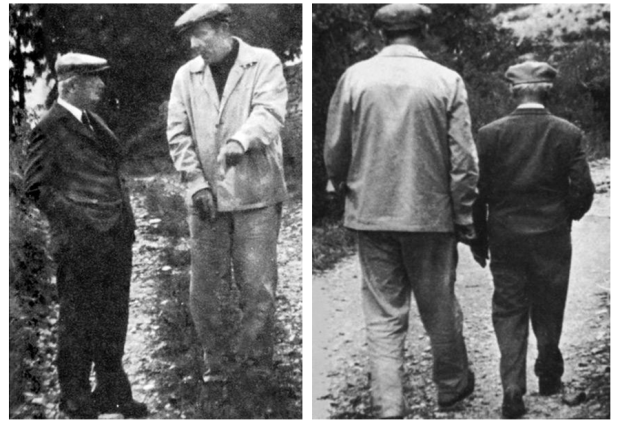An iconographic and text archive related to communication, technology and art.
In our time people have learned to subordinate friendship to what’s called “convictions.” And even with a prideful tone of moral correctness. It does take great maturity to understand that the opinion we are arguing for is merely the hypothesis we favor, necessarily imperfect, probably transitory, which only very limited minds can declare to be a certainty or a truth. Unlike the puerile loyalty to a conviction, loyalty to a friend is a virtue—perhaps the only virtue, the last remaining one.
☛ Encounter by Milan Kunder, tr. by Linda Asher, New York: HarperCollins Publishers, [2009]2010, pp. 113-114 (read it with Amazon’s Look Inside feature). Original French version is reproduced below.
This excerpt is part of a very short essay about “Enmity and Friendship” included in the collection Encounter (originally published in French as Une Rencontre, Gallimard, 2009). Kundera main argument is that
[…] friendship subordinated to an interest considered superior to friendship has nothing to do with friendship. (p. 113)
Or as he puts it earlier in the essay (I’m paraphrasing): nothing is more stupid than to sacrifice a friendship for political reasons (that is political conflict). As a case illustration for his argument ―the superiority of friendship over political convictions― Kundera cites the apparently incongruous relationship between René Char and Martin Heidegger:
I look at a photograph of the poet René Char alongside Heidegger. The one celebrated as a French résistant to the German occupation, the other denigrated for sympathizing with early Nazism at one point in his life. The photo dates from the postwar years. The two are pictured from the rear; with caps on their heads, one figure tall, the other short, they are taking a walk in the outdoors. I am very fond of that photo.
The photograph Kundera is talking about was taken by French writer, translator and longtime friend of Martin Heidegger, Roger Munier (see his official website). Although Kundera talks about a photo where “the two are pictured from the rear” there are in fact two shots of the event: one shows the two men from the rear, the other shows them from the front (René Char is the tall one):

René Char never denied this friendly relationship, but by the end of his life he put some perspective on the way it was received by the public:
Je n’ai rien à voir avec la philosophie de Heidegger. Je suis poète, pas philosophe; Parménide et Platon n’ont rien à voir ici. Heidegger était un homme aimable, qui a su faire que nous restions en bons termes, même après que nous eûmes épuisé ce que nous avions à nous dire
The quote above comes from a very interesting article entierly dedicated to the relationship that once existed between René Char and Martin Heidegger: “’Between’ Poetry and Philosophy: Rene Char and Martin Heidegger” by Michael Worton (published in Reconceptions Reading Modern French Poetry, Russell King and Bernard McGuirk editors, University of Nottingham, 1996, pp. 137-157, PDF). A must read for anyone interested about this particular subject matter.
Maybe a somehow similar (although certainly not identical) case could be made of the relationship that once brought together Walter Benjamin and Carl Schmitt. Giorgio Agamben points to the strangeness of this brief intellectual encounter in his State of exception. About a citation Benjamin made of Political Theology and a letter he sent to Carl Schmitt, Agamben writes that:
both of which attests to an interest in and admiration for the “fascist public law theorist” […] and have always appeared scandalous. (tr. by Kevin Attell, Chicago: University of Chicago Press, [2003]2005, p. 52).
The idea of friendship as being superior to political bonds is interesting. It could be interpreted as an alternative form of social bounding when the political apparatus is experiencing troubles. Could friendship holds the community together when democratic regimes failed to do so? Then again, I believe the true and deep friendship Kundera is writing about is not suited for large group but only applies to the relationship between few individuals.
Here’s the original French version of the excerpts quoted from Kundera’s Encounter:
Mais l’amitié qui est soumise à un intérêt supérieur à l’amitié n’a rien à faire avec l’amitié.
Dans notre temps on a appris à soumettre l’amitié à ce que l’on appelle les convictions. Et même avec la fierté d’une rectitude morale. Il faut en effet une grande maturité pour comprendre que l’opinion que nous défendons n’est que notre hypothèse préférée, nécessairement imparfaite, probablement transitoire, que seuls les très-bornés peuvent faire passer pour une certitude ou une vérité. Contrairement à la puérile fidélité à une conviction, la fidélité à un ami est une vertu, peut-être la seule, la dernière.
Je regarde la photo de René Char à coté de Heidegger. L’un célébré comme résistant contre l’occupation allemande. L’autre dénigré à cause des sympathies qu’il a eues, à un certain moment de sa vie, pour le nazisme naissant. La photo date des années d’après guerre. On les voit de dos; la casquette sur la tête, l’un grand, l’autre petit, ils marchent dans la nature. J’aime beaucoup cette photo. (Une rencontre, éd. Gallimard, Paris, 2009, p. 134)
I first came across Kundera’s quote via the blog Enowning.
- By Philippe Theophanidis
- on
- ― Published in Art, Communication
- Tagged: Agamben, Benjamin, friend, friendship, Heidegger, Kundera, René Char, Schmitt
